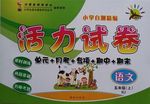题目内容
【题目】七选五(共5小题; 每小题2分,满分10分)
根据短文内容,从短文后的选项中选出能填入空白处的最佳选项。选项中有两项为多余选项。
Many people’s English in reading or writing is good, but most of their spoken English is poor. How to improve your spoken English? Here are some tips.
Listen to a lot of high-quality spoken English. Listen to a higher level of language if you want good English. As a beginner, listen to instructional CDs or software. When you are ready, listen to quality news, documentaries and movies in English.
【1】 You will need a lot of listening to improve your English, so commit to listening for an hour or mare every day.
【2】 Read in English every day to increase your vocabulary. Read material you understand but gradually increase its challenge level. Try to read for 30 minutes to one hour every day.
Record your spoken English and listen to the playback. Try to hear your own strong and weak points. If you are taking an English class at a school with a language lab, ask for pronunciation software. Listen to the speakers, record your own speech and play it back to compare. 【3】__
Pay attention to grammar when you speak. If you don’t know the rules, take a grammar class and ask English-speaking friends to correct you. 【4】 Language learning experts believe that we learn grammar better by hearing and reading the language.
【5】 Seek out opportunities to talk to English speakers. Join a club, talk to travelers and make new friends who speak English. Enjoy activities with English speakers so that you use English in real-life situations. Speaking our thoughts aloud will also help you improve your oral English.
A.Read to challenge yourself.
B.This practice will help you improve your pronunciation.
C.Improve your fluency(熟练)by speaking English every day.
D.Your need to learn good English for business or academic purposes.
E.If you don’t live in an English-speaking country, find those sources on the Internet.
F. When you are alone at home or in the car, you can also speak English out loud for practice.
G. However, don’t expect grammar exercises to take the place of listening and reading.
【答案】
【1】E
【2】A
【3】B
【4】G
【5】C
【解析】
试题分析:许多人英语阅读和写作能力很好但口语很差,文章讲述提高口语的方法。
【1】E 根据上文提到When you are ready, listen to quality news, documentaries and movies in English如果你准备好的话可以听一些高质量的新闻和英语电影。故选E.如果你没有住在说英语的国家,也可以在找一些材料。
【2】A 根据下方提到Read in English every day to increase your vocabulary.用英语阅读会增加你的词汇,故选A 用阅读来挑战自己,故选A项。
【3】B 根据上文提到Listen to the speakers, record your own speech and play it back to compare.听人说,录下自己的发音,进行对比,故选B 这种练习会提高你的发音。
【4】G 根据If you don’t know the rules, take a grammar class and ask English-speaking friends to correct you.如果你不知道规则的话,上一些语法课,让一些说英语的朋友来纠正你,故选G然而不要期望语法来代替你的听力和阅读。
【5】C 根据下方提到Seek out opportunities to talk to English speakers寻找机会多与人对话,

 活力试卷系列答案
活力试卷系列答案 课课优能力培优100分系列答案
课课优能力培优100分系列答案